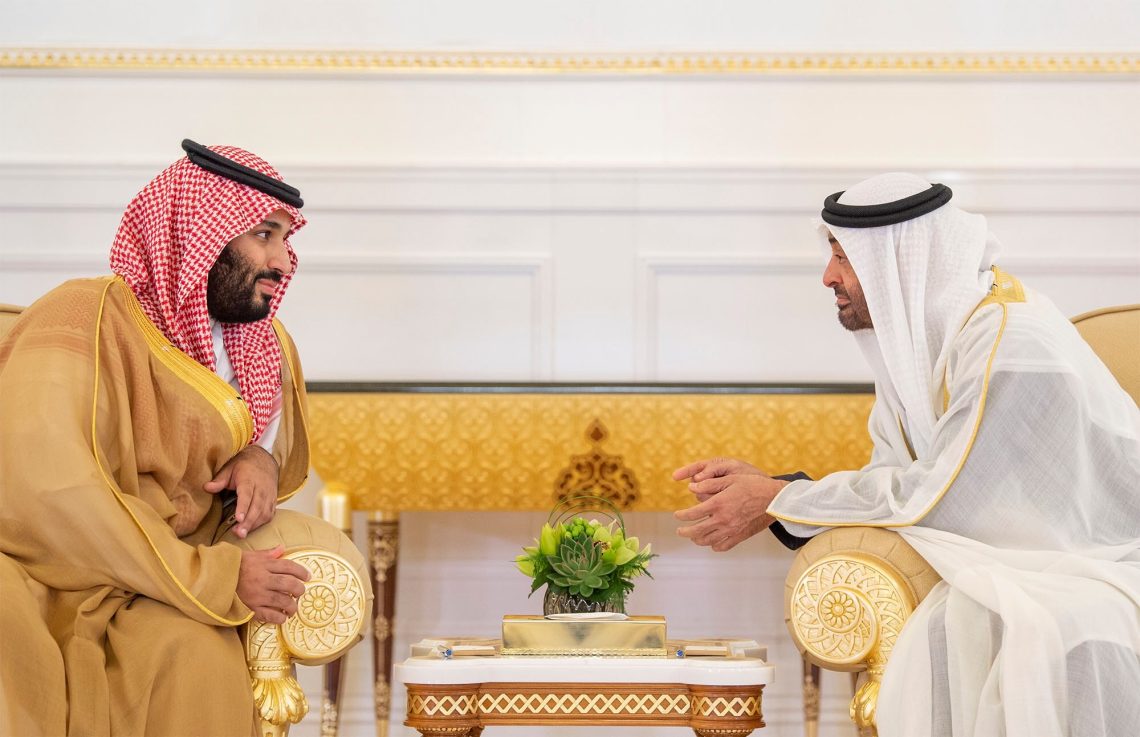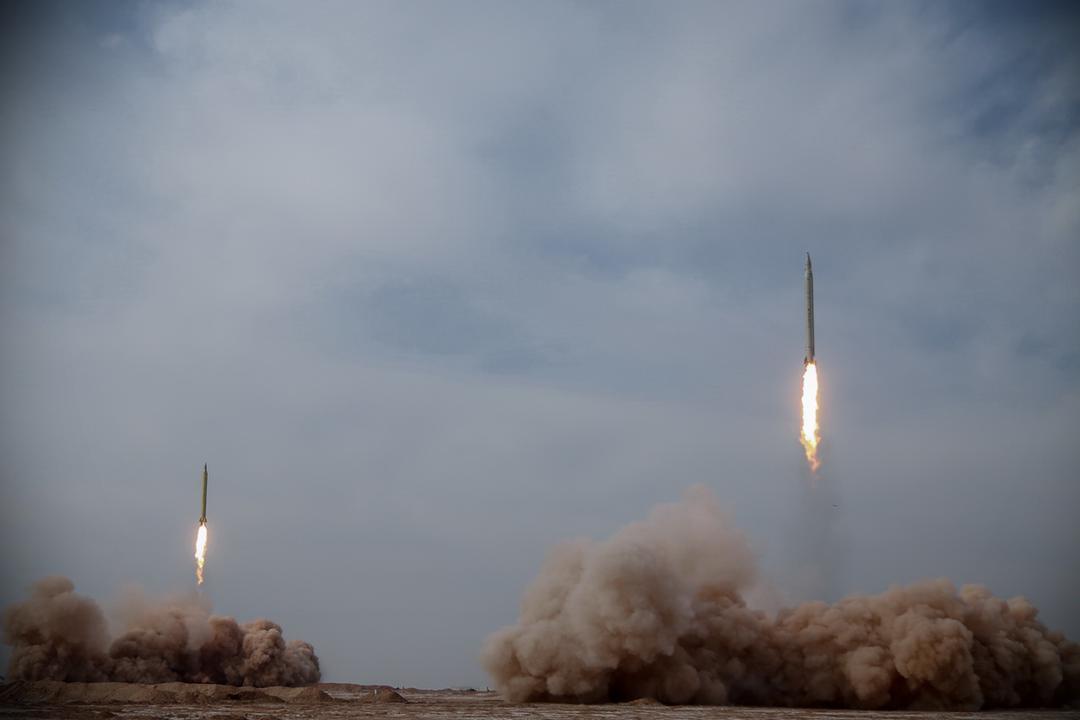Gulf states seek elusive common policy
The U.S. disengagement from the Middle East has left Gulf states scrambling to hedge their bets. From under Iran’s shadow, they are bolstering defenses and looking to deepen alliances.

In a nutshell
- The Gulf states are facing new regional uncertainties
- Alliances with Turkey and Israel will be crucial
- The prospect of an Iran nuclear deal looms over all
Coming after decades of war and political upheaval in the region, Washington’s intention to disengage from the Middle East has left Saudi Arabia and the United Arab Emirates hedging their bets. On the one hand, they are now looking for ways to reopen dialogues with enemies and rivals; on the other, they hope to strengthen bonds with the rest of the Gulf Cooperation Council (GCC), Bahrain, Kuwait, Oman and Qatar.
All will find themselves on the front lines if Iran continues to develop nuclear capabilities and enters into open conflict with the West. The Gulf states no longer feel sure of the political and military backing from the United States that sustained them for so long. And the need to make new alliances has led them to mend fences with Turkey as well, in spite of very real differences. Feelers sent out to Tehran with a view to lessening its hostility have yet to bear fruit. In Yemen, Iran has refused to rein in its Houthi proxies, as they intensify drone attacks on Saudi Arabia (and even, recently, on Abu Dhabi).
Leading the pack
The Emirates are at the forefront of these new endeavors, while Saudi Arabia focuses on maintaining its preeminent position in the Gulf. Theirs is an uneasy partnership – not only because of past confrontations but also diverging interests. The GCC countries do not present a united front: Oman is at pains to appear neutral on Iran, enabling the small kingdom to bypass Saudi Arabia to broker compromises with Gulf countries. Qatar has a special relationship with Tehran, and is accused of funding the Muslim Brotherhood and Islamist terror organizations such as al-Qaeda, leading to a (recently lifted) boycott by other Gulf members.
Nevertheless, during the last decade, Saudi Arabia and the Emirates have acted together on prominent issues, like helping Abdel-Fattah El-Sisi take over the presidency in Egypt and cooperating in the fight against the Houthi rebellion in Yemen. Together with Egypt, they are siding with General Khalifa Haftar in Libya, and succeeded in having closer relations with the Trump administration.
Trying to improve ties with Iran and with Turkey is a two-pronged gamble born of necessity, but one with little hope of success.
A special bond has developed between the two crown princes, Mohammed bin Salman of Saudi Arabia (widely known as MbS) and Emirati Mohammed bin Zayed (MbZ). They mostly share the same views, although MbZ has been less wary of Iran. The Emirates have withdrawn some of their troops in Yemen, and following the capture of a few ships in the Gulf of Oman, concluded in August 2019 a memorandum of understanding with Tehran on security in navigation in that zone. They are also working to restore diplomatic ties with Syria and foster its return into the Arab League – a move opposed by Riyadh because of Iran’s continued presence and influence in Syria.
In January 2020, perhaps fearing that Washington was distancing itself in the aftermath of the Jamal Khashoggi affair, Saudi Arabia convened a special summit of the GCC in the northwestern city of Al Ula to reinforce links between member states and mend the rift with Qatar. The harsh conditions for lifting punitive measures, such as Qatar cutting ties with Iran and political Islam, and shutting down the Al Jazeera channel, were not met. Turkey rushed to the aid of an ally that supported radical Islam, dispatching troops to reinforce military bases it established a few years earlier. It also exported food and staples to the beleaguered country.
Nevertheless, it was decided to restore relations and tighten cooperation. In July 2021, Saudi Arabia welcomed Omani Sultan Haitham bin Tariq Al Said, who in January succeeded longtime ruler Sultan Qaboos bin Said Al Said, with the aim of turning a new leaf.
Eye on Ankara
Trying to improve ties with Iran and with Turkey is a two-pronged gamble born of necessity, but one with little hope of success. Tehran was critical of the Emirates’ decision to buy 50 Rafale fighter planes from France and acquire advanced U.S. F35 aircraft and drones. And it was incensed at the 2020 normalization agreements with Israel, which it perceived as a direct threat to “regional security” – conveniently forgetting its own threats to the Gulf states, its attacks on tankers in the Gulf and its determined pursuit of nuclear capability.
Emirati strongman MbZ made the first overt move, going to Ankara in November and meeting with President Recep Tayyip Erdogan to sign cooperation and investment agreements on trade, renewable energies and technology. This was welcome news for Turkey, as its national currency was spiraling and the economy in free fall.
It did not, however, address core issues. Mr. Erdogan promotes the expansion of political Islam and organizations such as the Muslim Brotherhood. Turkey helped and armed Islamic groups in Syria and Libya, and cut off ties with Egypt after President Mohamed Morsi’s ouster. Already in 2014, the Emiratis – staunch opponents of the Brotherhood – published a list of global organizations affiliated with the movement to help identify and combat them. The UAE further opposes Islamic militias in Libya and Iran’s Houthi proxies in Yemen.
In fact, relations between Turkey and the Emirates were worsening in spite of ongoing economic cooperation, which amounted to $9 billion in trade between the two in 2020 and 650 Turkish companies working in the UAE. That activity did not prevent Mr. Erdogan from accusing the Emirates of assisting the failed 2016 coup or from condemning the Abraham Accords with Israel. Still, necessity is pressing the two countries to put aside differences and seek a dialogue on their political and security interests.
Tehran’s shadow
Meanwhile, MbZ dispatched national security advisor Tahnoun bin Zayed Al Nahyan to Tehran, where he held talks with Iranian President Ebrahim Raisi to discuss bilateral ties and extend an invitation to Abu Dhabi. In parallel, Iran’s chief nuclear negotiator to the nuclear talks in Vienna, Ali Bagheri Kani, made a short trip to the Emirati capital. Iran has welcomed these meetings as a dent in ties between the U.S. and the UAE, which hosts significant numbers of French and American troops; Jebel Ali, its largest port, is essential to the operations of the U.S. fleet in the Gulf of Oman and the Arab Sea.
For its part, the Saudi kingdom, where five American military bases are located, made discreet overtures to Tehran to assess possible confidence-building steps. Riyadh wants Iran to stop launching drones and missiles via the Houthis and come to an understanding about a long-term cease-fire in Yemen. There have been four rounds of talks in Iraq, the last one on September 21, with no tangible progress. The Houthis have even intensified their attacks in the Marib and Shabwa provinces against the Saudi-led coalition, and have continued strikes on Saudi Arabia with missiles and drones. The Biden administration, in removing the Houthis from the U.S. list of foreign terrorist organizations last year, encouraged further attacks on the kingdom.
At the annual summit for Gulf leaders, held in Riyadh on December 14, Saudi Arabia’s Mohammed bin Salman took the opportunity to demonstrate their renewed unity and forge a consensus on foreign and security objectives under his leadership. The previous week MbS had visited each of the other five GCC members and struck cooperation agreements worth over $1 billion.

Particular emphasis was placed on his meetings with the Emirates and the ensuing joint communique extolling the ties between the two countries and their shared strategic approach to the region. On Iran, it holds that the nuclear negotiations should address stability and security in the Gulf. As for Lebanon, economic reforms should be implemented to restore order and undermine the influence of the Hezbollah militant group. The communique also dealt with the conflicts in Yemen, Iraq, Syria, Libya, Sudan and the Palestinian issue, and the need for diplomatic solutions based on United Nations decisions.
That document was to be the blueprint for the final draft of the summit communique, mostly devoted to the Iranian threat. Gulf leaders called on Tehran to take concrete steps to reduce tension, condemned its support for the Houthis and demanded representation at the talks in Vienna. Finally, they said that an attack on one GCC member would be considered an attack on all. The states would keep on working on an economic union and on common defense and security, while acting in concert on the international scene. It would seem that MbS achieved his goals.
New friends
Saudi Arabia and the Emirates conducted joint military exercises in November, and in January the armies of all six countries took part in more drills, broadcasting their military capacities alongside their diplomatic efforts. Well aware of their military inferiority vis a vis Iran, the Gulf states are doing their best to compensate. Saudi Arabia is building a nuclear research plant (not under IAEA supervision) and, according to CNN, is developing ballistic missiles with the help of China capable of carrying a nuclear warhead.
Israeli Prime Minister Naftali Bennett came to Abu Dhabi on December 13, one day before the Gulf summit, in the first such visit by a leader of the Jewish state. Iran and security issues took center stage, with discussions on Israeli readiness to supply advance-warning systems for drones and missiles. The head of the Emirati air force had previously come to Israel in November to observe large-scale international exercises that included eight countries, and for talks with his Israeli counterpart. The Gulf states are well aware that Israel is in constant contact with the U.S., attempting to block a return to the 2015 Iran nuclear deal.
Washington hopes to draw away from the Middle East and focus on its confrontations with China and with Russia.
The Houthis’ unprecedented attacks on Abu Dhabi on January 17 and 27 could significantly alter the situation. Claiming responsibility after the first attack, a Houthi spokesperson revealed they sent 20 cruise missiles, ballistic missiles and drones, and threatened to continue if Abu Dhabi did not stop its intervention in Yemen. This escalation came after heavy losses inflicted on the Houthis by Yemen’s elite “Giants” brigades, backed by the UAE. The former lost their strategic positions in Marib and Shabwa provinces, with casualties estimated at 10,000.
Following these attacks, Mr. Bennett sent a letter to MbZ proposing intelligence and security assistance, while Israeli President Isaac Herzog paid a state visit to Abu Dhabi to emphasize Israel’s commitment to the safety of its new Abraham Accord partner.
The elephant in the room
The six Gulf states now face a period of uncertainty – desperately trying to figure out what the U.S., their most important ally, will do. Washington still keeps troops in the Gulf, while its navy and its air force use bases and ports in Saudi Arabia, Abu Dhabi, Qatar, Bahrain and Kuwait.
But since the inauguration of President Joe Biden, new concerns have emerged. Will the U.S. fulfill its obligations regarding the safety of the region? The American president did confirm (after some hesitation) the sale of F35 fighter planes to Abu Dhabi, but insists on imposing restrictions to make sure that technologies are not leaked to China, which enjoys close ties with the Emirates as part of the Belt and Road Initiative. Meanwhile, missile sales to Saudi Arabia continue apace.
This has not been enough to quiet the doubts. Washington hopes to draw away from the Middle East and focus on its confrontations with China and with Russia. Even if flare-ups make a disengagement impossible, no one knows how the U.S. will react to them. It has made clear a preference for diplomatic solutions, notwithstanding that Middle East conflicts are rarely solved without the threat (or even implementation) of military action.
Iran and its militias attack American bases in Iraq and Syria with apparent impunity. Just as the GCC summit was getting underway, a White House spokesperson stated there were no more fighting troops in Iraq, and that the remaining 2,500 U.S. soldiers were there as advisors and logistics assistants in a war against the Islamic State.
The messy Afghanistan withdrawal did nothing to inspire confidence in U.S. allies in the Gulf, where all await the outcome of the poker game underway in Vienna. Washington wants a return to the 2015 agreement despite Iranian violations, and is ready to cancel some of its sanctions. Iran is demanding the cancellation of all sanctions as a first step and is not even ready to talk directly with the American delegates. Though the U.S. seems to be losing patience with these tactics, talking tough will not delay Tehran’s progress toward a nuclear bomb.
All that is left for the Gulf states is to try to hedge their bets: bolstering their defenses, promoting alliances with Israel and Turkey, and looking for an understanding with a powerful, threatening neighbor. It is a neighbor that continues to pursue its aggressive policies, one that will not veer from its strategic objectives regardless of whether Washington endorses a new nuclear treaty. Nothing short of a credible military threat will give it pause.








